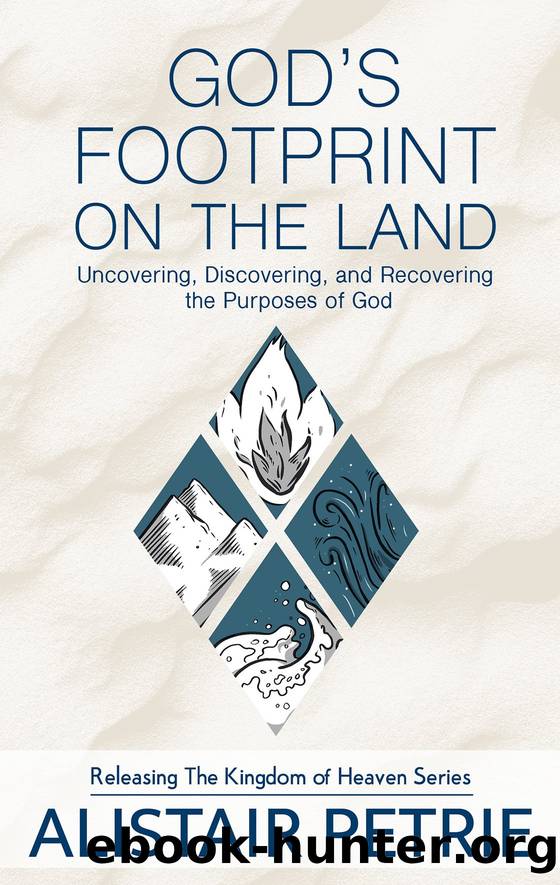God's Footprint on the Land by Alistair Petrie

Author:Alistair Petrie
Language: eng
Format: epub
Published: 2021-02-12T22:32:41+00:00
Chapter 5
The Consequences
We were asked to speak at a leadersâ conference in a Caribbean nation. Following the conference, several leaders asked us to take a field trip to a specific area well-known in the nation. The problem was that the cattle and the people were always ill when living on this particular piece of land â but when moved to another area, they were fine. No productive harvest ever occurred on this particular piece of property. One could tangibly experience a sense of fear and apprehension that seemed to affect the entire area. God was revealing the consequences of past issues that had never been addressed which involved idolatry, bloodshed and betrayal. With the landowner, and local representatives, there was a time of prayer and repentance and re-dedication of land. This was maintained (stewarded) in the weeks following our departure. New growth in harvests, livestock, and a sense of peace came upon the land. The old had gone and the new had begun.
Scripture is clear. When the relationship with God is broken, there are consequences. While society in general may have grown accustomed to a life in which the intervention and Presence of God is not necessarily looked for or experienced, nevertheless, it is wise that we see what these consequences involve. This enables us to see from Godâs point of view and to understand why certain things seem to exist or occur in one area, but reality in a neighbouring area can be quite different.
Ezekiel 14 is one passage that refers to all four consequences, or judgements, each having many different variations depending on the circumstances unique to our communities.
1. Famine
(Ezekiel 14:13; Amos 8:11)
The issue of famine speaks for itself in that there is an absence of growth and productivity upon the land necessary for sustaining life in that area. But the consequence of famine also enables us to determine earlier sins that may have occurred, and which need to be identified and addressed, especially when this famine is not just food-based.
When using the church as a litmus test, famine can be expressed as both physical and spiritual hunger that is never satisfied. It can be:
A hunger for identity and purpose.
A hunger for the Presence of God.
A hunger for meaningful relationships that never seem to be fulfilled between God and people â and between the people themselves.
A famine of experiencing little harvest in the lives of the people, even after a great deal of ministry and effort is undertaken.
2. Ecological Devastation
(Ezekiel 14:15; Jeremiah 23:10; Deuteronomy 11:17; Amos 4:7; Haggai 1:9â11)
This refers to much sowing but little harvesting both in the lives of people and in the land itself. Jeremiah 23:10 describes it in these graphic words â âThe land is full of adulterers; because of the curse the land lies parched and the pastures in the wilderness are witheredâ¦â If we ignore God, it will affect all of life as we experience it.
Haggai 1:9 describes this in detail â ââYou expected much, but see, it turned out to be little.
Download
This site does not store any files on its server. We only index and link to content provided by other sites. Please contact the content providers to delete copyright contents if any and email us, we'll remove relevant links or contents immediately.
The 5 Love Languages: The Secret to Love That Lasts by Gary Chapman(9784)
The Space Between by Michelle L. Teichman(6929)
Assassin’s Fate by Robin Hobb(6199)
Wiseguy by Nicholas Pileggi(5769)
Everything Happens for a Reason by Kate Bowler(4733)
Gerald's Game by Stephen King(4641)
Pillow Thoughts by Courtney Peppernell(4271)
A Simplified Life by Emily Ley(4157)
The Power of Positive Thinking by Norman Vincent Peale(4061)
Harry Potter and the Prisoner of Azkaban (Book 3) by J. K. Rowling(3347)
Resisting Happiness by Matthew Kelly(3337)
Girl, Wash Your Face by Rachel Hollis(3282)
Being Aware of Being Aware by Rupert Spira(3272)
The Secret Power of Speaking God's Word by Joyce Meyer(3178)
The Code Book by Simon Singh(3177)
More Language of Letting Go: 366 New Daily Meditations by Melody Beattie(3020)
Real Sex by Lauren F. Winner(3014)
Name Book, The: Over 10,000 Names--Their Meanings, Origins, and Spiritual Significance by Astoria Dorothy(2978)
The Holy Spirit by Billy Graham(2944)
